
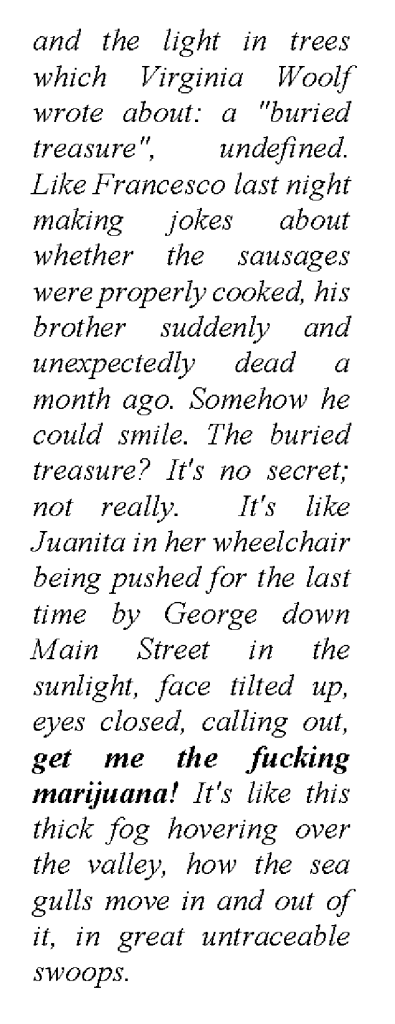
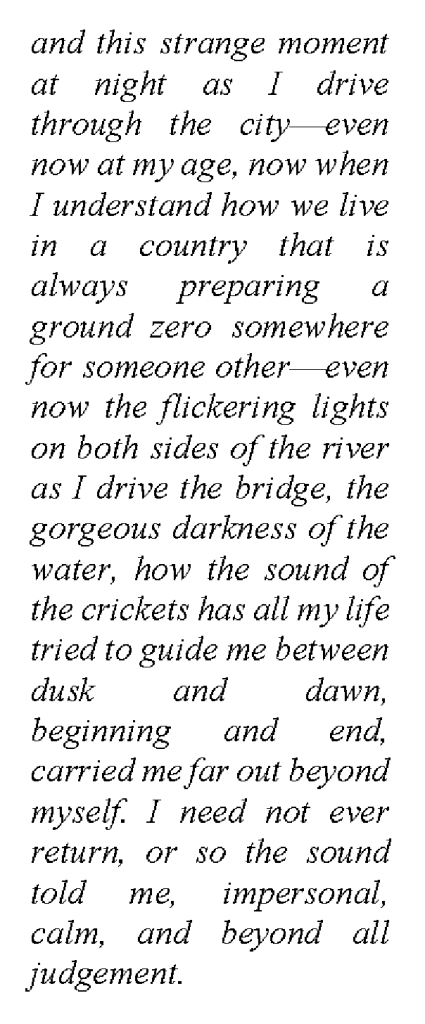
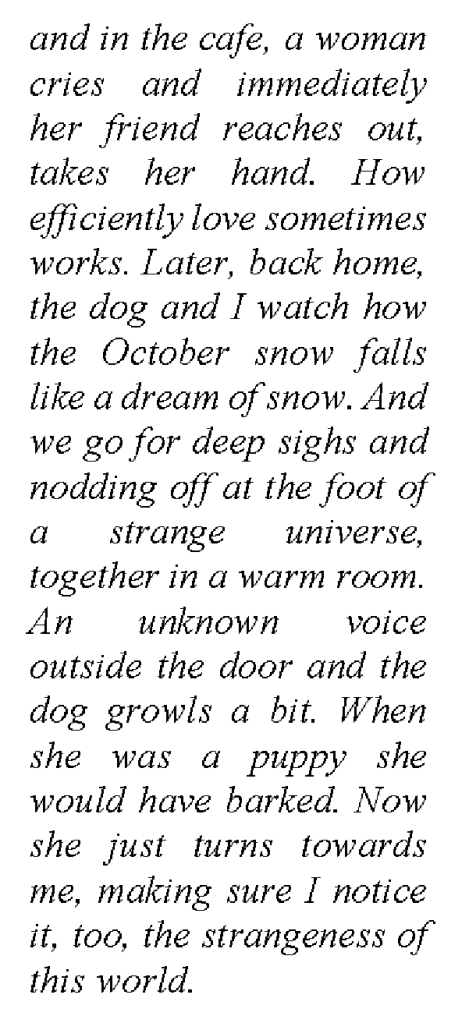


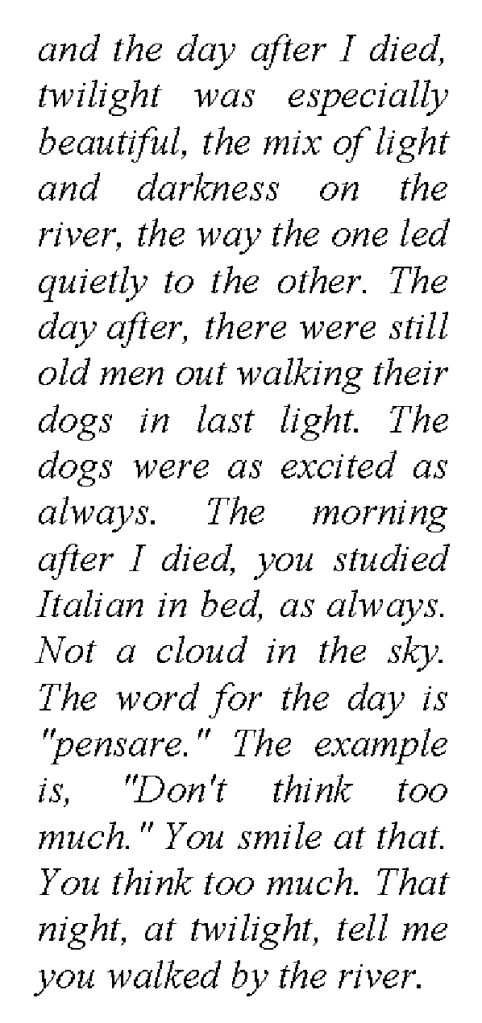
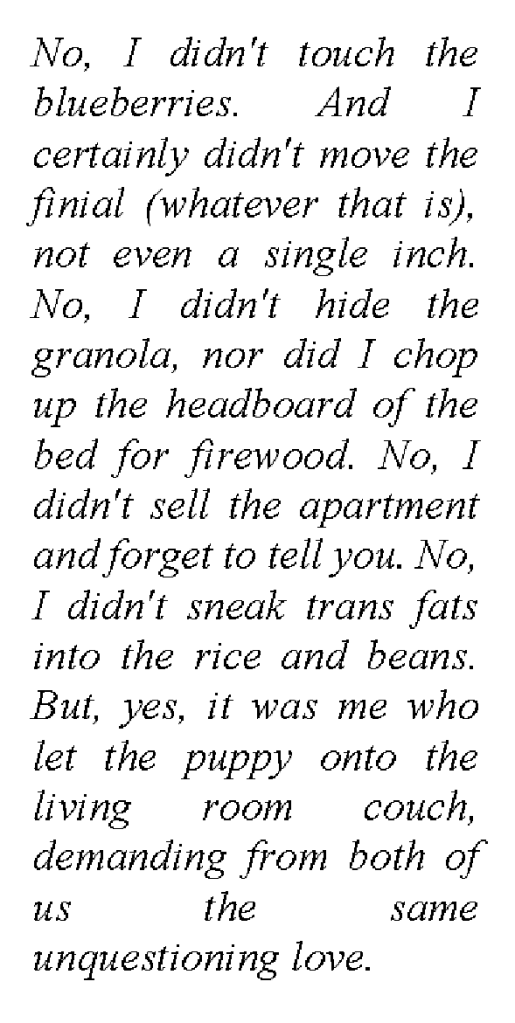
Author’s Note
COMING BACK TO SPOLETO
For almost four decades I have returned again and again to Spoleto, Italy. My wife and I first came here on our honeymoon at the recommendation of a well-travelled friend (“Most beautiful city in the world”). Something unexpected happened: we fell in love. I had never fallen in love with a place before, and the synchronicity between falling in love with my new wife and falling in love with this ancient city was not to be argued with.
At a certain point in life, you want to be in the place you love more than anywhere in the world for at least one more time. You want to smell its smells–coal and raw earth, olives being processed in November, their perfume floating out over the countryside, a smell somehow redolent of sex, as if the whole countryside had just gotten out of bed on a Sunday morning.
After all, you’ve had a lifetime of joy, a lifetime of sorrow just like anyone else who makes it to seventy six: why not go back yet again to Spoleto, this time in rainy November? Why not try once again to give yourself over to love? It’s tricky this business of love. But what better business is there?
***
Coming back after a long absence, when we ask the taxi driver at the railroad station how things are in Spoleto he says, “Very bad. So few people are left here. There is no money. And worse yet there is no hope. The young people are leaving.” He goes on in this way; his gloom relentless and strangely calm, as if, in the end, resignation might be the only consolation in a life understood clearly enough, truthfully enough. His is a dispassionate melancholy: Spoletino to the core. He laughs after he finishes his little speech; but this is not the laughter of a man amused by life.
It is an elegant car in which we sit and he keeps it immaculately, a BMW as spotless as his desolation. He is probably in his sixties. There is nothing of the hesitant old man about him. He is trim from head to foot, and keeps his back straight as he drives, radiant with the energy of a man all dressed up with nowhere to go. It is as if he has readied himself for an event of great importance, an event that gets put off again and again. Or has it been cancelled entirely? He is a man who exudes power, but is unable to find a way to exercise it to any useful purpose. All he can do is wait in front of the railroad station by the open door of his taxi, umbrella in hand, and hope that someone will get off the train from Rome and need a ride.
***
This first evening back, we go to a dinner with friends from America, mostly artists, each of whom has found his or her way to homes near Spoleto, though not in Spoleto. Homes with amazingly expansive views across a valley or meadow, towards mountains perhaps, or tiny villages situated far below. Even though in many cases it was Spoleto that initially drew them to Italy they find themselves turning away from the city itself. It began with the difficulty of how hard it has become to find a parking place in Spoleto, and then how quick the meter maids (high heels or not) are to give tickets. But it has moved on from that initial discomfort to how defeatist the people often are in Spoleto, how melancholy, how gruff they can be. Have you noticed, our friends say, how they walk with their heads down? And then there is the matter of all the stone: the houses are stone, the churches, the shops, even the internet point is encased in ancient stone, a flicker of modernity buried inside a medieval tomb. Stone shapes the city; its narrow almost impassable streets and the feeling of foreboding that is never very far from the surface. Everywhere you turn in Spoleto there are stony shadows dogging your steps like bad memories that just won’t leave you in peace.
***
And I do know what my friends mean. Not to speak of how scarred the city looks with all of the reconstruction work going on, thanks to government money released in the wake of a recent earthquake. There are streets—whole neighborhoods—in which the city feels as if it has been bombed; marked for destruction. There are broken windows and gaping walls, roofless houses, chipped cobblestones. So many cranes sticking up in the air, motionless for days and weeks at a time, poised above our heads like clumsily constructed guillotines, awaiting the order to be dropped. The sounds of jackhammers, the sight and feel of clouds of cement ground down to dust as it hangs in the air, wires dangling out of windows without glass, through which can be glimpsed the emptied rooms of houses that are supposedly under reconstruction but which can stand empty for months or years at a time. Mesh screens meant to hide from view the work going on behind them only add to the sense of desolation like a flimsy stage set, poorly constructed. Spoleto, like a person who suddenly realizes he has entered far into old age, can feel like a city under siege, barely hanging on
But then comes the moment when I sit on a stone ledge in Piazza Del Duomo, the piazza which for centuries has been the beating heart of Spoleto. I remember how two decades earlier I used to watch the old men sitting on the same ledge, just as I am doing now on our first night back. And suddenly I am also an old man and I can’t even begin to say how much pleasure I take on this chilly November evening, watching the life in the piazza, two young girls, sisters in matching red dresses, the younger one following the older one’s lead as they run past me. Mothers with strollers, small groups of friends standing in clusters as they laugh and talk, gesticulate in that signature Italian way: we are excited to be alive and we will take up as much physical space with our excitement as we can. Teenage girls parade back and forth between the café and the church, then over to the fountain, then back to the café again, walking arm-in-arm. Younger boys and girls kick soccer balls, old men—even older than me—arms bent behind their back (we sometimes say, “There’s another one whose had the operation,”) perhaps staring thoughtfully at the geraniums arranged on the ledge that runs around much of the piazza, as if flowers blooming in November might be the answer to an important, but difficult question, a question that must be asked over and over each evening at around this time. Tourists sit at the café watching the world go by and the world watches them in return. And it is a world, a universe entire on a Sunday evening at 7 PM in any season except for the dead of winter and even then a few of us diehards will be here, walking briskly back and forth across the empty space of the piazza, as if on patrol though there is, of course, nothing to guard but the idea of the place and our own memories.
***
What to do when a city you love seems to be falling apart right before your eyes? When an empire starts to lose its grip? When a man both evil and stupid becomes the leader of your country? When someone—perhaps even oneself—begins to age beyond the point where it can be ignored?
What do you do when you feel broken––betrayed––by your own life? And what do you do when you feel your country has broken––-has betrayed––its own life?
When I know that I am close to dying, maybe I will be lucky enough to be able to make my way to the Piazza del Duomo where tonight the younger sister shadows the older sister as they run together in their red dresses. Probably I will know what time it is because then, as now, I will have just heard seven bells. It is a Sunday evening. The older people’s faces in the piazza look stunned with tiredness, but at the same time, at peace.
***
A few years before my parents began to die, but at a time when I could see those deaths approaching–as now I can see my own approach–I went every day for a month to the Duomo in Piazza del Duomo, and sat before a fresco by Fra Filipo Lippi which covers the whole front of the church, stretching from one side of the altar to the other. Every day I sat there and though I am not a Christian I felt like a believer: a believer, I suppose, in the power of art to console. I had felt this before, but never to this extent and for such a long period and at a time of such personal need, the new awareness of my parents’ fragility constantly with me.
I was often unhappy at that time, if anxiety with no apparent reason is a kind of unhappiness. But when I sat in front of that Fra Filipo Lippi fresco I would calm down, as if I were someone who didn’t have a problem in the world as long as he kept looking at those figures: the dying Mary in the central panel, lying in a bed in the middle of the Umbrian burnt siena landscape; and panels to either side, one with Joseph and the Mary, and another with the Annunciation. Wherever my eye travelled there was the sense that I was being given the world and all its travails, but at the same time all its beauties. And, yes, the two were connected and, no, I didn’t understand how. I saw looks on faces in that fresco that contained emotions which I didn’t have a name for. What do you call a tenderness that is at the same time filled with power? What do you call a sadness framed by ecstasy? But all these are just clumsy words for something that is wordless. It felt as if I had a duty to sit before it. To pay attention.
I felt as if Lippi was trusting me with so many amazing details, trusting me simply because I was alive and because I had bothered to sit with him like that, day after day. When I was a boy a Boy Scout leader had taken the time to teach me how to tie certain knots. It took him a long time. He was calm and patient, but at the same time unrelenting in his need for me to learn how to tie those knots. Lippi, too, had that kind of patience and unrelenting quality as I sat before his fresco, not trying to tie knots but to untie them.
Near the central panel with the dying Mary, saints stand calmly. I looked at them closely. It seemed that they really did believe all was well in spite of the fact that Mary was on her death bed. There was a pale one, quite young. Not a saint. His face was grief stricken. He understood a very different truth from the older saints. He realized that when the mother goes, part of life leaves with her, never to return. I envied those older saints, the ones who wear gorgeous blue robes and walk calmly through the world’s paintings. But it was the boy who I needed most, how he peered into the face of Mary’s death without turning away.
***
If this is a city that is falling apart–and it has been doing so for centuries–at the same time it feels purposeful: it knows how to continue. It is strange that a city that has suffered so much can feel so inviting. The city’s melancholy and a kind of sleepy happiness are so deeply entwined it is difficult to tell them apart. I stand outside this embrace looking in at it, almost like a voyeur standing uneasily outside a window at night looking in at two people in love, holding each other.
At 76, on the precipice of I know not what, I need less and less, though sitting under the silver light glinting off olive leaves is hardly less and less, listening to the thunder and waiting for the rain to return, unhomed for sure at the side of the small empty road that runs along the edge of the city.
This is a city that will never truly belong to me no matter how often I come here, though I am allowed to sit very near it, as now I am allowed to sit near a young couple with their baby, who have sat on the bench, next to mine in the early darkness, the mother counting the first stars as they appear as if they were gods suddenly returning from before the time human history began to go wrong. The family gets up from their bench and leaves. I sit alone underneath a darkening hill, its indistinct olive trees like small clouded shrouds. Now the church bells from the nearby Duomo that had been ringing in that melancholy arrhythmic way that means a funeral is happening have stopped. The dead one is buried and only the living remain to call heaven by its true name, this life of ours here on earth.
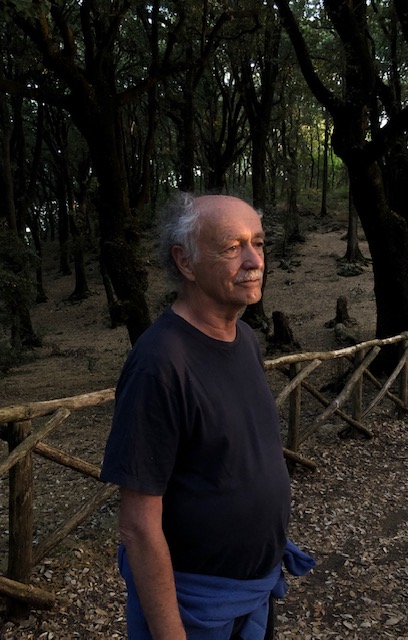
Jim Moore’s most recent book of poetry is UNDERGROUND: NEW AND SELECTED POEMS from Graywolf. Graywolf will publish his next book in 2021 or 2022. Jim lives in both Minneapolis and Spoleto, Italy. He is a recipient of a Guggenheim Fellowship and his poems have been published in APR, The Paris Review, The New Yorker, The Nation, The Sun, The Gettsyburg Review and other magazines. He is married to the photographer, JoAnn Verburg.